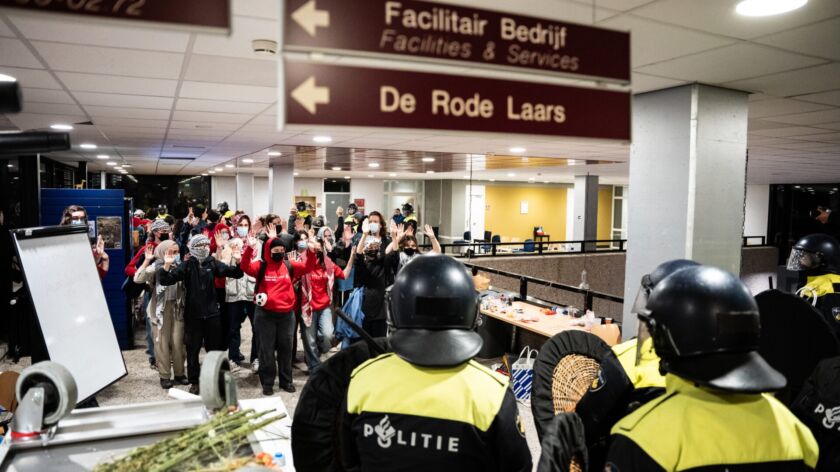‘Governing is not only about listening, but also about acting and being accountable’
-
 Photo: Johannes Fiebig
Photo: Johannes Fiebig
OPINION- The Executive Board must stop reflecting on actions and instead make concrete administrative decisions that stop our complicity in normalizing and legitimizing occupation, apartheid and genocide. So write a dozen employees of Radboud University. Their letter to the editor is a response to a column by Rector Magnificus José Sanders earlier this week.
Dear Rector,
We would like to respond to your column from this past Monday.
Listening is very important – especially when it comes to complicity in normalizing occupation, apartheid and genocide. However, governing is more than just listening. Governing also means making decisions and being accountable.
We expect our administrators not only to listen, but to subsequently weigh the information gathered. From a scientific institution, we should hope that this is done on scientific grounds, such as burden of proof and critical thinking.
Let’s start with the burden of proof when it comes to the fundamental points on the basis of which students call for cutting institutional ties with Israeli universities: the situation in Gaza, the role of the Israeli academy in it, and the effectiveness of an institutional boycott.
International courts and the UN have time and again provided hard evidence that it is plausible Israel is perpetrating genocide in Gaza. Maya Wind, and before her many Palestinian scholars, have amply demonstrated that Israeli universities are a crucial link in Israel’s decades-long policy of occupation and apartheid, and now also help to make the genocide in Gaza militarily and politically possible. Researchers have shown for other contexts, such as South Africa during the apartheid era, that an institutional boycott of scientific institutions is effective – something underscored by the open letter Israeli scientists recently sent their government calling for a cease-fire so as not to jeopardize their science business.
This means that the burden of proof is now on the Executive Board. The protesting students and various collectives of academic staff have provided convincing scientific evidence that a genocide is underway in Gaza; that Israeli universities are helping to enable it; and that boycotts are effective. The Executive Board, on the other hand, has so far failed to provide any evidence for the assumptions that substantial or effective criticism of Israel’s genocide in Gaza has come from the Israeli universities with which our university is institutionally affiliated, and that maintaining ‘open lines of communication’ with these institutions supports or protects such critical voices. Indeed, the Executive Board itself admits that they have not yet had any contact with their Israeli partners about ’the situation in Gaza’.
It is thus abundantly clear that the focus on the ways in which students and staff draw attention to their arguments and requests (’they ate the chocolates!’) is a deliberate smokescreen in order to avoid talking about those arguments and requests themselves (ending our complicity in normalizing and legitimizing genocide), which have been presented for months at demonstrations, in talks and via emails without any substantive response. Their position is not at all substantiated by facts, an is as such unworthy of an academic institution.
In addition to providing evidence, demonstrating critical thinking is one of the foundations of science. Here, too, the attitude of the Executive Board fails. By assuming that equating all the voices they listen to, adhering to the status quo, and following directives from the Department of Education equals neutrality, objectivity, or reasonableness, they deny the reality of extreme power imbalances and inequalities that students are opposed to – both on campus and in national and international politics. Applying double standards when it comes to Russia and Israel and denying the extreme asymmetry in the ‘conflict’ between Hamas and Israel is also politics, albeit politics that goes against the norms and values we claim to protect as a university (as well as against – ‘detail’ – international law).
Governing is not only listening, but is also about acting and being accountable. We call on the Executive Board to do so on this issue in the spirit of their own motto: with courage (e.g., to go against ministerial directives), connection (e.g., by addressing students who are doing everything they can to get their university on the right side of history not only in terms of their methods, but also taking their analyses seriously) and openness (e.g., not only talking about committees, but also sharing whose expertise is and is not considered appropriate for participation in such review mechanisms).
What we need now from the Executive Board, in short, is not a reflection on the ‘acts we perform with language and communication’, but concrete administrative decisions that stop our complicity in normalizing and legitimizing occupation, apartheid and genocide.
Eefje Derix, Marieke van Houte, Kamile Kartal, Gaard Kets, Martijn de Koning, Elke Linders, Harry Pettit, Mathijs van de Sande, Anya Topolski, Adriejan van Veen, Laura de Vos en Marieke Woensdregt.



